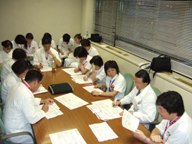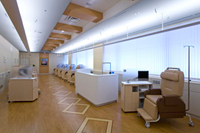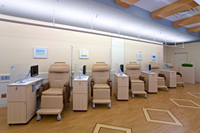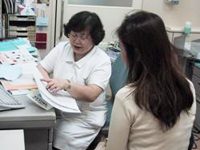
Overview
At the Pulmonary Medicine Department, particular attention is given to the medical care of lung cancer, respiratory tract infections (e.g., pneumonia), bronchial asthma, interstitial lung disease, emphysema, and sleep apnea syndrome. The hospital is also a regional-designated cancer care hospital, and high-quality care is provided consistently at every stage from the initial consultation through palliative care.
Diseases and Expertise
- Basically all respiratory diseases are treated
- Our specialties include the treatment of lung cancer, pneumonia and other respiratory infections, bronchial asthma, interstitial lung disease, emphysema (COPD), as well as medical sleep apnea syndrome.
- This hospital is a regional-designated cancer care hospital, and the Pulmonary Medicine Department provides consistent care spanning the course of treatment from the first consultation to palliative care of patients with stage ⅢB and Ⅳ lung cancer.
- This department does not only provide treatment of lung disease, but we emphasize a holistic approach to the patient, and take advantage of the hospital’s position as a general hospital to maintain the highest quality of care possible.
- We also put much effort into the training of resident physicians, and perform clinical research.
- Clinical trials of new drugs are conducted when there is a need.
Outpatient Chemotherapy (Oncology Center)
For lung cancer consultations, we provide a coherent treatment from the first treatment to palliative care. We introduced outpatient chemotherapy very early on and we provide the latest lung cancer treatment on an outpatient basis.
At the Oncology Center, we have full-time Oncology Pharmacy Specialists and Oncology Certified Nurses that provides detailed care for our patients.
Once a month, the Pulmonary Medicine Doctors, Pharmacists and Nurses (Outpatient, Hospital Ward, Palliative Care departments) come together to review problematic points related to treatment and care for all of our lung cancer patients.
Asthma Clinic
Team Medical Care
The respiratory area is an important area that especially requires the cooperation of doctors, nurses, pharmacists and co-medical (radiation technologist, laboratory technician, rehabilitation, social workers, etc.).
A large portion of our hospitalized patients are elders and there are many who have complications aside of respiratory illnesses such as circulatory disease, diabetes and cerebral infarction aftereffects. We utilize our quality as an “internal medicine” department to provide total care for our patients with the cooperation of other departments. We also utilize the fact that we are a “general hospital” to cooperate with all other departments to establish a system that makes care possible for the entire body, and not only the lung.

Coalition with Nurses/Pharmacists
Each month, doctors, nurses (outpatient, hospital ward, palliative care) and pharmacists come together to hold a conference regarding lung cancer treatment for all of our outpatient lung cancer patients. By sharing the treatment methods of nurses and pharmacists (not only doctors) and discussing the distress of lung cancer patients, we are now able to provide a holistic care.
Coalition with Social Workers
Where a patient continues treatment post-hospitalization is a very important decision. Social workers will take care of this problem. For patients who need to transfer hospitals, the social worker at our hospital will make rounds in the Pulmonary Medicine department once a week to understand the disease condition and accurately grasp problematic points in order to recommend a facility that best fits each patient.
Coalition with Home Nursing Station
We conduct Home Oxygen Therapy (HOT) and Noninvasive Positive Pressure Ventilation (NPPV) therapy for patients with chronic respiratory failure such as emphysema (COPD). Home treatments, are conducted in cooperation with the home nursing care station. Patients needing care after hospitalization, we will receive visits 1-2 times a week. Home care treatment is possible with the thorough communication between the home nursing care station and the main physician.
Equipment
- X Ray (Conventional, 1 x CT: 320-slice, 1 x 64-slice, 1x 16-slice)
- MRI (1x 3.0T, 2 x 1.5T, 1 x 1.0T)
- Nuclear Medicine Scan
- Bronchofiberscope
- Ultrasound Bronchoscope (Includes EBUS)
- Thoracoscope
- Radiation Therapy (LINAC)



